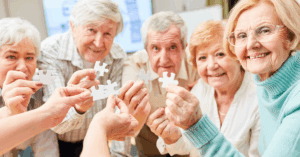Senior Guide: The Science Behind Puzzles and Brain Health
Science confirms puzzles aren’t just fun—they’re powerful brain workouts. When you solve puzzles, your prefrontal cortex lights up, strengthening critical thinking abilities.For seniors, the benefits are especially meaningful. Regular puzzle enthusiasts demonstrate thinking abilities comparable to people years younger! These activities simultaneously exercise visual perception, memory and reasoning skills.
The magic happens with consistency. For assisted living facilities in Eau Claire, WI, daily puzzle activities offer an enjoyable way to maintain mental sharpness and potentially slow cognitive decline. Care for your mind through playful challenge—your brain will thank you!
Types of Puzzles and Their Cognitive Benefits
Various puzzles offer unique cognitive benefits for seniors at Eau Claire, WI assisted living communities. Each type stimulates different brain regions, providing a comprehensive mental workout:
- Jigsaw puzzles enhance visual-spatial thinking, perception, mental rotation and memory recall. Regular enthusiasts maintain stronger visual-spatial skills throughout life.
- Word puzzles like crosswords keep minds functioning years younger than actual age. They build vocabulary, reading skills and focus while potentially delaying cognitive decline.
- Number puzzles such as Sudoku improve logical thinking through pattern recognition. They sharpen concentration, visual scanning and decision-making abilities.
- Brain teasers positively affect the central nervous system by triggering beneficial stress pathways that enhance attention and mental flexibility.
- Memory matching games are particularly effective for seniors, improving concentration, visual memory and object sorting skills.
Incorporating diverse puzzles into daily activities creates an enjoyable, comprehensive brain exercise routine that helps maintain cognitive function while bringing joy to senior living.
Emotional and Social Impact of Puzzle Activities
Puzzles provide remarkable emotional and social benefits for seniors beyond their cognitive advantages. Doing puzzle activities creates a calming effect that reduces stress and anxiety. Seniors can unwind while staying mentally active. This peaceful state leads to a better overall mood and emotional resilience.
Solving puzzles triggers dopamine release in the brain, creating genuine feelings of accomplishment that boost confidence and counteract depression in seniors.
At assisted living communities in Eau Claire, WI, puzzles become powerful social tools. Group puzzle activities foster meaningful connections and community bonds, whether through collaborative jigsaw projects or friendly word game competitions. These versatile activities adapt beautifully to both personal quiet time and social gatherings, meeting diverse needs while keeping minds engaged.
Puzzle groups in senior living communities give residents structured opportunities to:
- Make friends through shared problem-solving
- Exchange ideas and strategies that encourage communication
- Feel joy through group achievements
Regular social activities like puzzles help curb isolation—a common challenge that can hurt seniors’ mental health. These activities create a welcoming environment where conversation flows naturally around a common goal. As we’ve explored throughout this journey, puzzles serve as powerful tools for maintaining cognitive fitness in assisted living environments. The varied mental challenges they provide—from spatial reasoning in jigsaws to vocabulary building in word games—create a comprehensive workout for aging minds.
These engaging activities deliver both cognitive stimulation and emotional well-being through dopamine release, accomplishment and meaningful social connections.
Short daily puzzle sessions contribute significantly to brain health over time. By incorporating puzzles that bring joy rather than feeling like work, seniors can maintain sharper minds and enriched lives. We invite you to discover how puzzles improve focus and create moments of achievement in your daily routine.
Contact Heritage Oakwood Hills at (715) 831-9118 to learn how our assisted living in Eau Claire, WI, can help your loved one thrive through engaging cognitive and social activities.
FAQs
Q1. How do puzzles benefit seniors’ cognitive health?
Puzzles provide comprehensive cognitive workouts, activating multiple brain regions. Regular engagement with puzzles can enhance memory, problem-solving skills and attention.
Q2. What types of puzzles are most beneficial for seniors?
Various puzzle types offer unique benefits. Jigsaw puzzles improve visuospatial cognition, word puzzles like crosswords enhance vocabulary and memory and number puzzles such as Sudoku develop logical reasoning. Brain teasers and memory-matching games are also valuable for overall cognitive stimulation.
Q3. Can puzzles help with emotional well-being in seniors?
Yes, puzzles can significantly impact emotional health. They create a calming effect that reduces stress and anxiety. Completing puzzles releases dopamine, boosting mood and self-esteem. These activities also provide a sense of achievement, which can help combat feelings of depression often associated with aging.


